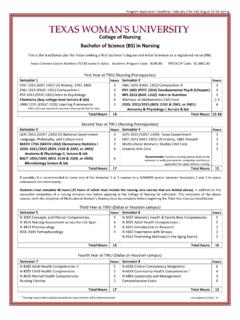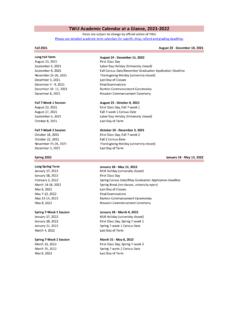Transcription of The Causes of World War I - TWU Home
1 The Causes of World War I by Patrick Alessandra The historiography of the Causes of World War One has always been a field fraught with conflict. The political implications of where to place the blame in the aftermath of the war, and the sheer scale of the conflict have caused many a historian to put forth their own interpretations of why The Great War began that fateful summer in 1914. The historiography of World War I has fluctuated from blaming Germany, to the idea that the war was a horrible accident, to blaming Austria-Hungary's ethnic tensions, to more holistic views that take into account the millions of individual factors involved in modern times.
2 Like so many areas of history, the Causes of World War I are a source of endless contention for historians. One of the biggest schools of thought in regards to the Causes of World War I is exemplified by the w riting of Fritz Fischer. In his book Germany s Aims in In The First World War first published in Germany in 1961, Fritz Fischer makes the case that The Great War was largely the responsibility of Germany. He paints a picture of ever escalating European tension fueled by Germany s angling for increased resources and He emphasized the German antagonism with France as central to Germany s approach to general European war, w hich Germany saw as inevitable.
3 In fact according to Fischer, the German leadership felt it needed a war to maintain Germany's status as a great World War I happened because Germany needed it, and her statesmen and generals forced it to explode, out of fears of a rising Russia and a scheming In contrast to this Germany centric view, A. J. P. Taylor, in his 1977 book How Wars Begin puts forth a different interpretation. Taylor theorizes that the true culprit behind The First World War was inflexible railroad mobilization They w ere timed and organized so precisely that if mobilization was paused after it began the country in question w ould be 1 Fritz Fischer, Germany's Aims in the First World War, (New York: Norton, 1967), 88.
4 2 Ibid., 49. 3 Ibid., 55. 4 A. J. P. Taylor, "The First World War," in How Wars Begin (New York: Atheneum, 1979), 110. defenseless for w eeks w hile new schedules were drawn up. Germany s timetables are particularly blamed by Taylor because they involved a direct deployment into Belgium and France to catch those nations by As such, he ascribes the w hole war up to a domino effect of increasing tensions and nations making escalations that has unintended and horrific consequences. Germany s overaggressive plan of mobilization though, was especially to blame. His views can best be understood by placing him in the Cold War context in w hich he was w riting.
5 Moving out of the more ideological interpretations of Fischer and Taylor, Samuel W illiamson in his 1991 book Austria-Hungary and the Origins of the First World War makes the case that the war s outbreak was due to ethnic and class tensions in the Austro-Hungarian Empire, and that Germany merely encouraged Austria-Hungary to take the actions it needed to in order to The picture W illiamson paints is of a dying empire torn by national strife and struggling to hold itself together in the face of the nationalism of the South Slavs. His Austria-Hungary cannot stand any more defeats and humiliations.
6 It has to crush Serbia no matter what in order to Germany s presence and assurances merely enable the Empire s leadership to risk upsetting Russia by attacking its ally: Serbia. Russia, the Austro-Hungarian leadership assumed, would back down in the face of German military might as it had previously and Austria-Hungary would restore a sense of national integrity by crushing Serbia. Things clearly did not go as planned and the war meant to save the Austro-Hungarian Empire destroyed it. How ever Williamson s book is more than likely influenced by the ongoing strife in the Balkans during the 1990 s.
7 Moving further towards the present, David Fromkin in his 2004 book Europe s last Summer: Who Started the Great War in 1914? strikes a balance between the arguments of W illiamson and Fischer. Fromkin theorizes that in actual fact World War I started as two wars. The war Germany prepared and pushed for against France and Russia, and the war Austria-Hungary needed against Serbia, w hich incidentally involved Echoing W illiamson, Fromkin reiterates the presence of ethnic and class tensions tearing Austria-Hungary apart, and the desperate need of the Austro-Hungarian leadership for a decisive show of military power and 5 Ibid.
8 , 117. 6 Samue l R. Williamson Jr., Austria-Hungary and the Origins of the First World War, (New York: St. Martin's Press, 1991), 197. 7 Ibid., 194. 8 David Fromkin, Europe's Last Summer: Who Started the Great War in 1914? (New York: Knopf, 2004), 260. national unity against Serbia in order to maintain their existence as a He also expands Williamson's point about Germany as enabler by going into detail on w hy Germany felt the need to support Austria-Hungary in the first place. Tying in Fischer s school of thought, Fromkin echoes him in stating that Germany needed to defeat Russia in order to secure its borders, so it supported Austria-Hungary's serbian ambitions hoping to spark a confrontation, and make the Tsar back down.
9 How ever, because their plans for war were so mismatched when it broke out the lack of coordination betw een Austria-Hungary and Germany severely weakened their opening The conflict and mutual needs of these two war plans and goal produced the First World War from the crisis in July 1914. Most recently Margaret MacMillan in her 2014 book The War that Ended Peace: the Road to 1914 adds a new spin on understanding the Causes of World War One by regarding its origins as a failure of the forces that advocated peace to hold back such a conflict from MacMillan examines the slow erosion of the anti-war forces in the lead up to 1914 in great detail, noting every moment when anti-war parties, or individuals are convinced to support their nation s entrance into The Great War.
10 She details the internal political struggles of all the great powers as they reacted to each other and their ow n people s nationalism , pacifism and patriotism. She concludes with the position that the war was either everybody's fault, or nobody s. 12 All the powers and a variety of factors such as nationalisms, archaic senses of honor and realpolitik w ere responsible for the outbreak of war, and she carefully avoids pinning the lion s share of the blame on anyone or any Though Germany was one of the first to have its troops cross the borders of another nation, she argues that this was largely because France and the triple Entente w ere desperately concerned about not being perceived as the aggressors.





